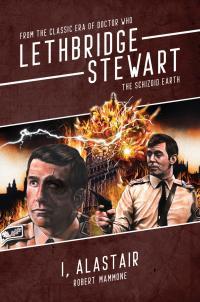I, Alistair
A Lethbridge-Stewart Adventure

|
|
Candy Jar I, Alistair A Lethbridge-Stewart Adventure |

|
| Author | Robert Mammone |  |
| ISBN# | 0 993 32211 5 | |
| Published | 2015 | |
| Cover | Richard Young and Will Brooks |
| Synopsis: Under the gentle guidance of the Leader, Britain has flourished after the removal of the dead hand of democracy and the old, corrupt aristocracy. Dominant in Europe, a Great Power around the world, the Republic stands as a beacon to wise, benevolent and firm leadership. The team led by Column Leader Alastair Lethbridge-Stewart is the best and brightest of us all, ensuring that attempts to overthrow the natural order will be stamped into submission. Those who stand with the Leader ensure that Britain remains great, a Power to be reckoned with, and a dominant force across the globe. |
We Didn't Start The Fire by Matthew Kresal 18/8/22
For fans of twentieth-century Doctor Who and the long-running character of Brigadier Alastair Gordon Lethbridge-Stewart in particular, 1970's Inferno has long been a favorite. After all, it presented a parallel world version of the show's UNIT characters, complete with a fascist version of Lethbridge-Stewart holding the rank of Brigade-Leader. Indeed, the actor behind the character, the late and still much missed Nicholas Courtney, would cite it as his own favorite serial in the role. It's no surprise then that Candy Jar's series focused on the character would explore the Brigade-Leader in some books, including here in Robert Mammone's 2020 novel.
Mammone's novel picks up on many of the elements used in David A McIntee's earlier novel in the range The Schizoid Earth (itself building upon McIntee's 1998 Past Doctor Adventure The Face of the Enemy in addition to Inferno) and expands upon them. Set years after the events of that novel but before Inferno, Mammone offers a master class in world-building, taking after legendary Who scriptwriter Robert Holmes in using throwaway lines to build up an entire world. Ones that offer up how this fascist Britain came to be (and avoiding the alternate history cliche of the Nazis winning the Second World War in the process), the state of the country and the wider world. For those who enjoy the kind of parallel universe and alternate history storytelling Inferno partook in, it's a reason to read the novel on its own.
It also helps that I, Alastair, like those McIntee novels, is very much a Who-inspired thriller piece. With this Lethbridge-Stewart being a member of the Republican Security Forces, the fact that he spends much of the book facing down a resistance group that's resorted to terrorism makes perfect sense. It's also full of intrigue as various factions within the government vie with one another for power as the resistance steps up its campaign. And that's without mentioning where the novel delves into what is perhaps inevitable SF territory, which, oddly, is its biggest weakness, as the inclusion of it feels forced into an otherwise Earthbound thriller (not to mention riffing heavily on something Modern Who did in its earliest days). And there's the semi-frustrating epilogue, which deals with the remaining plot threads but promising readers a whole other future novel for them to read. Even so, Mammone crafts a compelling thriller with plenty of twists and turns, not to mention action sequences that put this reader's mind imagining HAVOC stunt work and the work of legendary Who director Douglas Camfield.
For all the world-building and plot, Mammone doesn't lose sight of one thing that has made Inferno near and dear to generations of fans: its characterization of its alternate Lethbridge-Stewart. As the novel's title might imply, this book's focus rests heavily on that character, at the rank of Column Leader. Just as Courtney relished his chance to play a nastier, angrier, but at times cowardly take on the character, Mammone clearly does so in prose. Building on both the earlier novel and Inferno, Mammone explores more fully why this Lethbridge-Stewart is the way he is, getting to the heart of the matter through complicated family dynamics, including a politically ambitious and distant father pulling his strings. Yet Column Leader Lethbridge-Stewart is never entirely sympathetic, a soldier still too willing (or perhaps unable) to follow orders and employ violence. The contrast to the character fans have known for decades is clear, and it's another reason why the book reads so well.
Indeed, fans of Classic Who and the Candy Jar range reading the novel will also spot many alternate versions of familiar faces popping up. Among the TV characters are Anne Travers and her father Edward, Ben Knight from The Web of Fear and even UNIT stalwart Benton in a pleasing nod toward his role in Inferno. From the novel range is the Brigadier's father Gordon and, most poignantly, Sally Wright, both offering emotional weight to the narrative. As is often the case with these types of stories in various franchises, long-term fans will be the ones to pick up the most on the nuances offered by Mammone's choices. Yet newer fans or those who haven't necessarily read every single book (and this reviewer counts himself amongst the latter category) will still find plenty to enjoy in its brisk, thriller narrative.
And what more can you ask of it, besides that the other half of the duology it begins was out already?